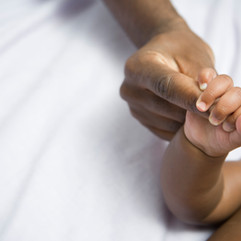Your Experiences
- Amanda Philipe-Savage

- Oct 22, 2022
- 4 min read
We all have experiences in life from conception to the day we die, shaping the person we become. Experiences are events that directly affect us; something we have witnessed either visually or auditorily, perhaps a recap from a third party or from the news, and the reaction to events by parents. They all have an impact on our behaviour, beliefs and sensitivity depending on how we process the information and whether there has been any exposure to previous events of a similar nature. They may drive us towards a particular vocation and how we lead our lives. There is also strong evidence that we inherit memories of a traumatic nature from our ancestors, and this is particularly true for Holocaust surviviors and their descendants.
Are all experiences traumatic? It depends on a number of factors and primarily on how the event is perceived and processed. Trauma, by definition laid down by the criteria for diagnosing post traumatic stress disorder (PTSD), is the lasting emotional response to an event that at the time put that person in a position of “actual or threatened death, serious injury, or sexual violence”. However, events can be difficult to define because the same event may be perceived as more traumatic for some people than for others, and therefore diagnosis is subjective. Although the situation may not have caused an "actual or threatened death, serious injury, or sexual violence”, it does not mean that the person's ability to cope in that moment in time wasn't compromised and caused feelings of helplessness, diminishing their sense of self and affecting their ability to feel a full range of emotions and experiences afterwards.
Trauma does not discriminate. It is experienced worldwide from the most dependant stage of human development to the most aware and independant, and on to the frailty of the golden years. Sometimes, another event may trigger a feeling of helplessness, panic and being overwhelmed with emotion, similar to the primary event. I could list various situations that may have caused you to feel unsafe but that might be a trigger in itself. So instead, I would like to highlight some symptoms which you might be experiencing and have not been able to resolve, due to an underlying and unknown root cause - an experience.
The most common emotional symptoms are: sadness, anger, denial, fear and shame. These may lead to: nightmares, insomnia, relationship problems, emotional outbursts. You may be experiencing some physical symptoms, such as: nausea, dizziness, altered sleep patterns, change in appetite, headaches, digestive disorders. Ongoing, these may develop into PTSD, depression, anxiety, dissociative disorders (including memory loss of certain time periods, events, people and personal information), and drug or alcohol dependancy. All these symptoms can develop from a single, repeated or multiple varied events.
Any experience can be perceived as a loss. You can not undo, unsee, unhear, what you have experienced. What was before, is no longer. There has been a change, a loss. Even the most exciting and perceptually positive events, such as a new relationship, marriage, a birth, moving home, starting a new job, taking a holiday etc. involve an element of a change (stress) and loss (of your independance) which may cause negative symtoms relating to trauma, and in particular, diminishing your sense of self, resulting in lack of self-care.
Can you recover from these experiences? Yes. Will you ever forget the event? It is possible to re-frame the memory and prevent any further physical or emotional symptoms from developing, as well as recovering from any that have already arisen. Generally, recovery is seen in three stages. The first is feeling safe, with any appropriate support. The second is grieving the change or loss, and finally, restoring relationships - most importantly with yourself.
Your 'Journey of Transformation'© is a guided 9-week online programme, where you will learn how to find where you are holding your experience in your body, whether this is a physical symptom, behavioural pattern or particular emotion. You will then be given the tools to clear the toxic effects and how to draw on appropriate support within yourself, if a trigger should arise.
Forgiveness is the key to any healing, not only of the perpetrator but most importantly yourself. This is achieved through daily practice to ensure that you are able to process whatever crosses your path, ultimately turning fear into love.
Finally, functional movement. Generally, our coping mechanism to a stressful experience, is to 'hold' ourselves, as a form of protection. Sometimes, even 'holding onto' details, because it is too painful to process or you're in denial that it actually happened, results in constipation and urinary retention. Most commonly though, you will experience pain in the body from taking a protective stance, causing tightness and restriction in mobility. This will subsequently affect your lymphatic, circulatory and nervous system.
To give you an idea of how 'holding' can affect the body; fear of being able to move forward, often results in hip, knee or foot pain; carrying the burden of an event (keeping them secret), may result in neck or shoulder issues; backache is often a symptom of anxiety or depression because of the stress on the central nervous system.
Daily functional movement, practised with the other elements included in the programme, will restore your range of mobility and encourage optimal well-being. The movements are recorded and include alternatives for all levels of ability, and are accessible for life.
Please enquire at amanda@enjoybetterhealth for pricing and the next course starting date.
#trauma #inheritedtrauma #stress #ptsd #fear #pain #functionalmovement #forgiveness #dailypractice #taohealing # traumarecovery #loss #change #sadness #anger #denial #fear #shame #nightmares #insomnia #relationships #emotionaloutbursts #nausea #dizziness #alteredsleeppatterns #appetite #headaches #digestivedisorders #PTSD #depression #anxiety #dissociativedisorders













Comments